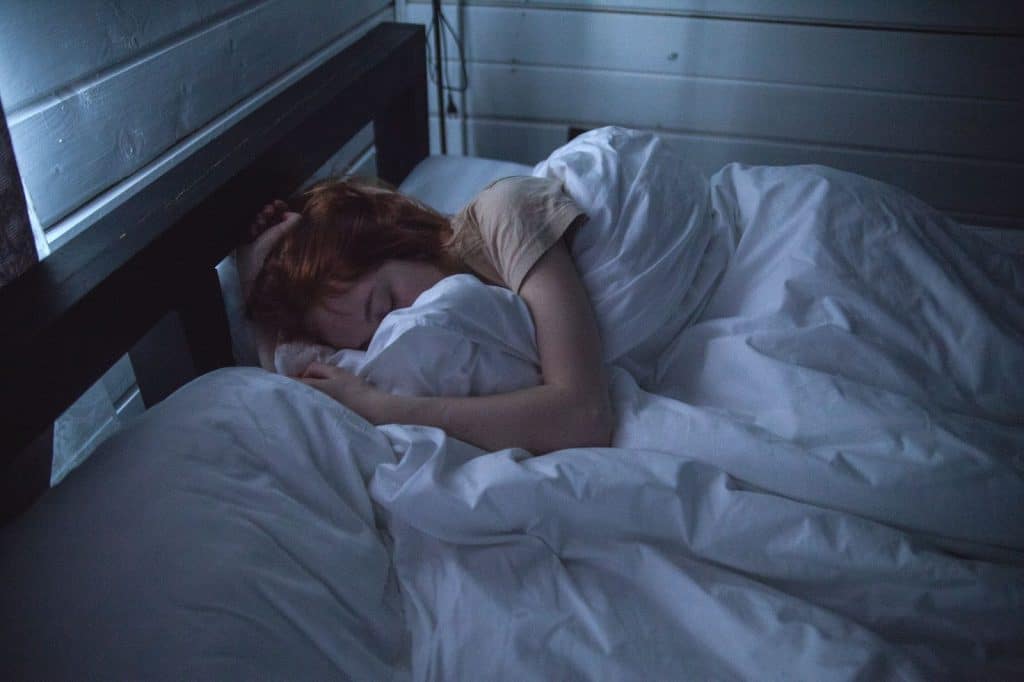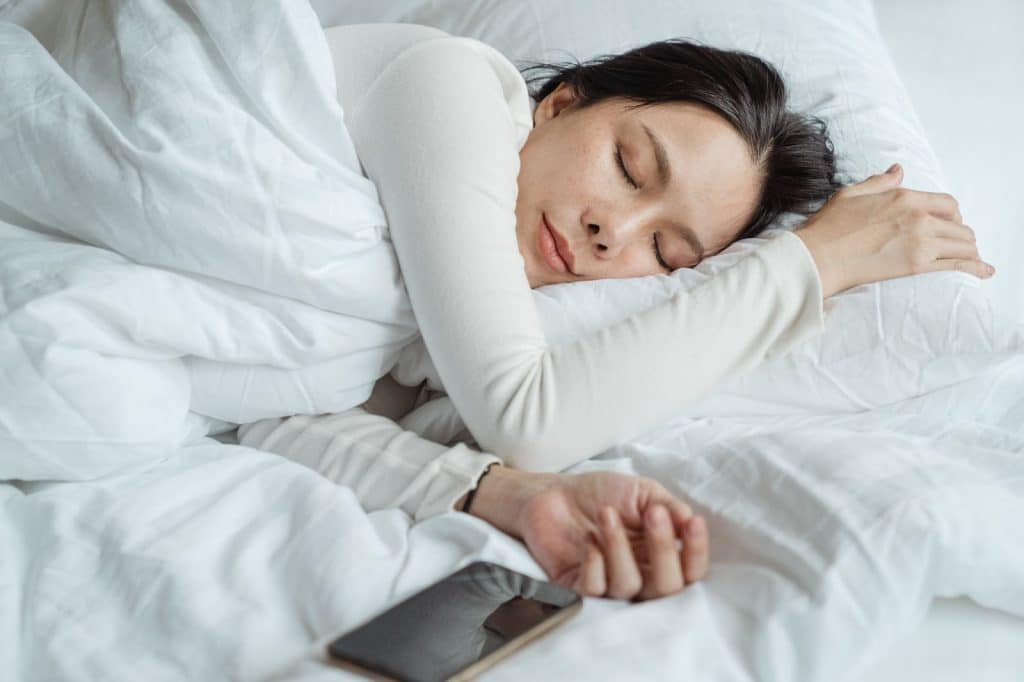Making your way to bed after a long day’s work feels so good. Today we’re looking at why this happens.
This article will explore the non-REM sleep stages of sleep when you feel good.
We’ll also briefly go over REM sleep, the kinds of dreams you can have, and the ways they may impact you. So keep reading.

Why Does Sleeping Feel So Good to Me?
There are 4 stages in sleeping, the first 3 are non-REM, and the fourth is REM (rapid eye movement) sleep.
Non-REM sleep feels good because your body and brain relax. Brain activity shoots up during REM periods which is when you have intense dreams. These may or may not feel good.
#1: Your Body Relaxes While You Sleep
The first reason why sleeping feels good is that your body relaxes. During the 3 non-REM sleep stages, your body and brain relax by:
- Slowing down breathing
- Slowing heart rate
- Relaxing muscles
Let’s explore each in detail.
1. Slowing Down Breathing
Breathing slows down during non-REM sleep, with the lowest rates being during stage 3. Also, breathing evens out and becomes less variable with each successive stage of sleep.
2. Slowing Heart Rate
Much like your breathing, your heart rate starts slowing down during the first stage of non-REM sleep. It continues decreasing till the third stage.
Blood pressure falls, and your body’s temperatures lower as well.
3. Relaxing Muscles
Muscles start relaxing once you fall asleep. This continues to happen over each stage of non-REM sleep. So by the third stage, your body’s total energy expenditure drops down considerably.
Muscle activity generally decreases. For instance, there is no eye movement during the third stage. Since fewer muscles are active, your body doesn’t have to use a lot of energy.
Your body’s stress hormone (cortisol) levels decrease during the first few hours of sleep as well. This hormone is your stress hormone. Since it goes down, you feel more at ease which relaxes your body.
Cortisol levels start rising around the time you have to wake up. That’s when you feel perky and start getting energized.
#2: Sleeping Feels Good Due to Reduced Brain Activity

The second reason why sleeping feels good is that your brain gets to rest a bit.
Since your breathing and heart rates slow down, your body doesn’t have to exert itself very much. The same thing happens when your muscles start relaxing. This leads to a reduction in brain activity.
Brain activity increases in Stages 2 and 3. However, this is a different type of brain activity than the kind seen during REM sleep. The brain waves activated then trigger vivid dreaming.
These are more like numerous quick bursts of brain activity. Such brain activity is calming and makes you feel good.
Read also: Why does time go by so fast when you sleep?
#3: Sleeping Feels Good Due to Hormone Levels Regulation
The third reason you enjoy sleeping is that it allows your body to regenerate.
Sleep feels good because your body regulates different hormones during this period. It’s your body resetting and balancing its chemical makeup. Since it is a natural process that must occur, you feel good about it subconsciously.
Some of the hormones being regulated include:
- Melatonin
- Growth hormone
Melatonin promotes sleep. It helps regulate your body clock and keep track of the timing of your circadian rhythms.
Growth hormone (GH) is released during sleep. It strengthens your muscles and controls height, bone length, and muscle growth.
Melatonin is also released before you sleep. It makes you feel tired and want to sleep. So when you decide to give in to what the hormone wants, you are listening to your body.
Being aware of and facilitating your body’s needs will make you feel good.
REM Sleep – An Overview
The third stage of sleep is known as REM sleep. During this period, a lot of the relaxing aspects of non-REM sleep go away. Your heart rate and breathing start speeding up, and your muscles become slightly tense.
They exist in a state of paralysis under atonia and so can’t move much. However, your body’s energy expenditure still goes up.
During the REM sleep stage, you have vivid, fantastical, or bizarre dreams. They may involve elements of your waking life but might not be completely coherent.
You can have dreams during non-REM sleep stages. However, those are always more coherent.
Since the dreams you have during REM sleep tend to be a bit outrageous, they can be quite disturbing. If you remember your dreams or spend a lot of time thinking about them, you may get stressed and impact your mental health.
You usually have nightmares during the REM sleep cycle as well. Frequent nightmares can affect a person’s mood and thinking patterns during the day.
Why Sleep Feels Good and is Important for Your Health

Irrespective of how good sleep does or does not feel, it is super important for you. There are several benefits of sleeping. In fact, this process impacts almost every part of your life.
Here are 4 benefits of sleep:
- Improved concentration and productivity
- Better mental health
- Improved physical health
- Boosted immunity
Let’s explore each in detail.
Improved Concentration and Productivity
Sleeping regularly for 8 to 10 hours improves concentration skills and makes you more productive. Regardless of the kind of work you do and the field you’re in, sleeping will make you better at it.
This means that sleeping will even make you better at mundane tasks.
Since sleeping revitalizes you, you have more energy to complete work. Your brain can exert more energy and effort for work.
Better Mental Health
Another benefit of sleep is that it can improve your mental health. Good quality sleep is linked to less anxiousness and more inner peace.
While sleep can’t cure illnesses like depression, it can make the symptoms a lot better. For instance, you’re less tired, have more energy, can make more of an effort for daily tasks, etc.
Improved Physical Health
Sleeping properly also keeps you away from issues like headaches and weight gain.
We talked about how your body regenerates and balances its chemical makeup while you sleep. If you don’t sleep enough or regularly, your body won’t be able to get those hormones. The absence of these hormones can lead to long-term health issues.
Long-term lack of sleep increases your risk of cardiovascular disease, obesity, and diabetes.
Boosted Immunity
M.D. Eric J. Olson says that sleep deprivation can affect your immune system. People who don’t sleep enough are more likely to get sick after being exposed to a virus or bacteria. Moreover, it impacts how quickly you recover after getting sick.
While you sleep, your body releases proteins called cytokines which help promote sleep. These proteins are essential for your body when it is fighting off an infection, inflammation, or stress.
Not getting enough sleep leads to an underproduction of these cytokines which means you have weak immunity.
Conclusion
A good night’s sleep feels good because your body relaxes during the first 3 stages of non-REM sleep. Your breathing and heart rates slow down while your muscles begin relaxing. Cortisol levels go down, too, which helps your mind relax.
REM sleep may not feel as good because it is characterized by faster breathing, increased heart rate, gradually rising cortisol levels, and vivid dreams. You may experience nightmares, but that isn’t guaranteed.
If your REM sleep is continually uncomfortable and you have trouble falling asleep, consider visiting a sleep specialist because you may have a sleep disorder.
Sleeping plays several important roles in ensuring your body functions properly. So you can’t go without adequate sleep. Choosing to do so means poor mental and physical health, decreased concentration and productivity, and bad immunity.
